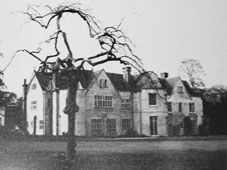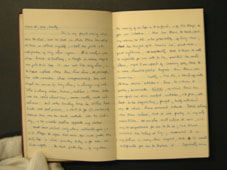England I
Brasch valued intellectual excellence, and for him it was the chief tool for civilizing man. Thus education was of uppermost concern, and indeed, many of his 'Notes' in Landfall deal with such issues. He read and marked this copy of Jung's work while at Missenden Abbey. Perhaps some of the Jungian principles within assisted him in his teaching of his young charges.
 |
In 1936 Brasch took his sister Lesley to Little Missenden to recuperate from an illness that she would eventually die from two years later. 'The Abbey' at Missenden was a school established for problem children run by an eccentric Englishwoman, Mrs Lister-Kaye. Brasch took a teaching job there; it was his first paid employment. |
| Missenden Abbey School, Brasch Papers, MS 996- 12/625 |
'This is my fourth evening at 23 Lawn Rd flats, but the first in which I have been able to sit down & collect myself, or feel the quiet & the satisfaction of being alone again.' So writes Brasch in his small but tidy hand. On this same double spread, he admits that the thought of a return to New Zealand is 'part vision, part nightmare' as well as believing that 'to write poetry is my sole raison d'être.' These are just a few of the personal insights into the private world of Charles Brasch from one of the many journals in the Brasch papers at the Hocken Library.
 |
|
| Charles Brasch, Journal, Lawn Road, London, 1942. Brasch Papers, MS 996-9/8 |
In July 1941, Brasch became a junior assistant at the Foreign Office, working at the Intelligence Centre at Bletchely. He maintained the administration system was like Kafka's The Castle, a book he had bought and read in Sydney in 1930:
'There was no strong authority at the head of affairs, everyone distrusted and was in rivalry with everyone else. Letters and protests passed, and no one would take decisions. For example, we could not get a proper stove in a new room we occupied until the unsafe one that had been resurrected from some outhouse set the room on fire. Rumours blew up and died away, moves were predicted, fixed, contradicted, so that we often worked quite uncertain what might happen to us next week. One wit declared that it only needed a few eunuchs about for the place to resemble the Byzantine court in the last stages of the Eastern Empire.'
(Indirections, p.374)
Brasch was called up in February 1941 and after an examination - 'conducted humanely' - and finding slight emphysema of one lung, he was deemed unfit for army service and registered as a Grade 3. For a short period, Brasch became a fire-watcher in the Finchley Road area. The sirens he heard - 'piercing and chilling, like the howling of wolves' seemed to him the death-wail of civilization.
John Lehmann, editor of the Geographical Magazine, asked Brasch if he would submit an article or two for publication. This letter from the editorial secretary about 'The Blockhouse' and the fare for a taxi is reminiscent of a time long past. The Blockhouse: an Egyptian memory appeared in the magazine in July 1941.
 |
|
| Letter from Joan Rodgers to Charles Brasch, 3 July 1941 |
Next >